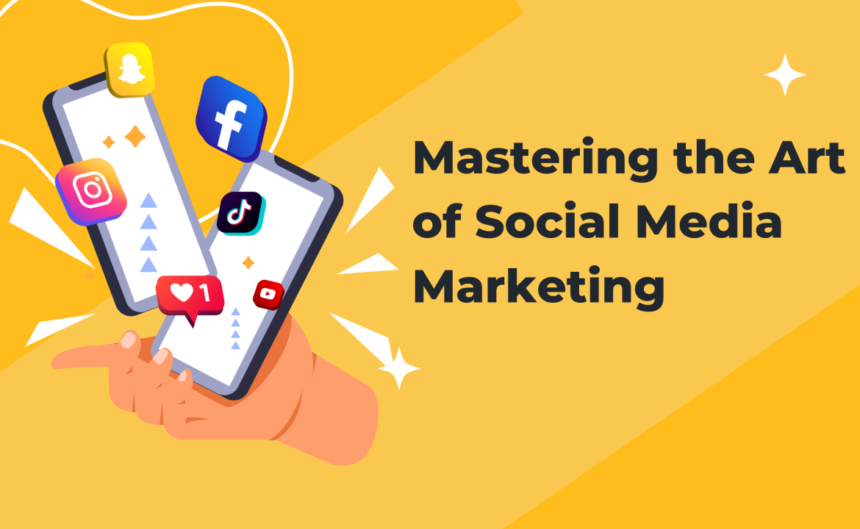Introduction
In today’s digital age, social media has become an integral part of our daily lives, influencing how we connect, communicate, and consume content. For businesses, social media platforms offer unprecedented opportunities to engage with their audience, build brand awareness, and drive sales. Social media marketing has emerged as a powerful tool for businesses of all sizes to reach their target audience, create meaningful connections, and achieve their marketing objectives. This article explores the fundamentals of social media marketing, effective strategies for success, and the evolving landscape of social media platforms.
Understanding Social Media Marketing
Social media marketing involves leveraging social media platforms to promote products, services, or brands and engage with customers and prospects. Unlike traditional marketing channels, social media allows businesses to interact directly with their audience in real-time, fostering engagement, loyalty, and brand advocacy.
Key components of social media marketing include:
Content Creation: Creating compelling and relevant content that resonates with your target audience is essential for social media success. This content can take various forms, including posts, images, videos, stories, and live streams, tailored to the preferences and behaviors of your audience.
Audience Engagement: Building relationships with your audience is crucial for fostering trust and loyalty. Responding to comments, messages, and mentions promptly, initiating conversations, and actively engaging with your audience demonstrates authenticity and builds a sense of community around your brand.
Brand Identity: Consistency in branding across social media platforms helps reinforce your brand identity and messaging. Establishing a cohesive visual aesthetic, tone of voice, and brand personality strengthens brand recognition and differentiation in a crowded digital landscape.
Analytics and Measurement: Monitoring and analyzing key metrics such as reach, engagement, and conversion rates provide valuable insights into the effectiveness of your social media efforts. Utilizing analytics tools allows you to identify trends, optimize performance, and refine your strategy for better results.
Effective Strategies for Social Media Marketing Success
To maximize the impact of your social media marketing efforts, consider implementing the following strategies:
Define Your Objectives: Clearly outline your goals and objectives for social media marketing, whether it’s increasing brand awareness, driving website traffic, generating leads, or boosting sales. Having a clear roadmap ensures that your efforts are aligned with your business objectives and measurable outcomes.
Know Your Audience: Understanding your target audience’s demographics, interests, preferences, and pain points is essential for crafting relevant and engaging content. Conduct market research, analyze audience insights, and gather feedback to tailor your messaging and content to resonate with your audience effectively.
Choose the Right Platforms: Not all social media platforms are created equal, and it’s essential to select the ones that align with your target audience and business objectives. Whether it’s Facebook, Instagram, Twitter, LinkedIn, TikTok, or Pinterest, choose platforms where your audience is most active and where your content is likely to perform well.
Create Compelling Content: Content is king in social media marketing, and creating high-quality, visually appealing, and valuable content is key to capturing and retaining audience attention. Experiment with different content formats, storytelling techniques, and creative elements to keep your audience engaged and inspired.
Foster Community Engagement: Building a loyal and engaged community around your brand involves more than just broadcasting messages—it requires active participation and genuine interactions. Encourage user-generated content, host contests, polls, and Q&A sessions, and foster meaningful conversations to cultivate a sense of belonging and advocacy among your audience.
Leverage Paid Advertising: While organic reach on social media is valuable, supplementing your efforts with paid advertising can amplify your reach, target specific audience segments, and drive measurable results. Experiment with various ad formats, targeting options, and budget allocations to optimize your ad performance and ROI.
Monitor and Iterate: Social media is dynamic, and what works today may not work tomorrow. Regularly monitor your performance metrics, gather feedback, and adapt your strategy based on insights and trends. Continuously testing and iterating your approach allows you to stay ahead of the curve and remain relevant in a constantly evolving landscape.
The Evolving Landscape of Social Media Platforms
Social media platforms are constantly evolving to meet the changing needs and preferences of users and businesses alike. Keeping abreast of the latest trends, features, and best practices across different platforms is essential for staying competitive in the digital marketplace.
Some notable trends shaping the future of social media marketing include:
Video Content Dominance: Video continues to dominate social media, with platforms like Instagram Reels, TikTok, and YouTube driving engagement and virality. Businesses are increasingly incorporating video content into their social media strategies to captivate audiences and tell compelling stories.
Ephemeral Content: The rise of ephemeral content, such as Instagram Stories, Snapchat, and Facebook Stories, has transformed how brands connect with their audience. Fostering a sense of urgency and authenticity, ephemeral content allows businesses to share behind-the-scenes glimpses, exclusive offers, and real-time updates to engage with their audience in the moment.
Social Commerce: Social media platforms are increasingly integrating e-commerce features, allowing users to discover, browse, and purchase products directly within the app. From shoppable posts and product tags to in-app checkout options, social commerce streamlines the path to purchase and creates new opportunities for businesses to drive sales and revenue.
Influencer Marketing: Influencer marketing continues to be a powerful strategy for reaching and influencing consumers on social media. Collaborating with influencers, thought leaders, and content creators enables businesses to tap into their established audience, credibility, and influence to amplify their brand message and drive engagement.
Augmented Reality (AR) and Virtual Reality (VR): AR and VR technologies are revolutionizing social media experiences, enabling immersive and interactive content that blurs the line between the digital and physical worlds. Brands are leveraging AR filters, lenses, and interactive experiences to create memorable and engaging content that resonates with their audience.
Conclusion
Social media marketing offers boundless opportunities for businesses to connect with their audience, build brand awareness, and drive tangible results. By understanding the fundamentals of social media marketing, implementing effective strategies, and staying abreast of the latest trends and innovations, businesses can unlock the full potential of social media as a powerful marketing tool. Whether you’re a startup, small business, or multinational corporation, mastering the art of social media marketing is essential for staying competitive, relevant, and successful in today’s digital landscape.






